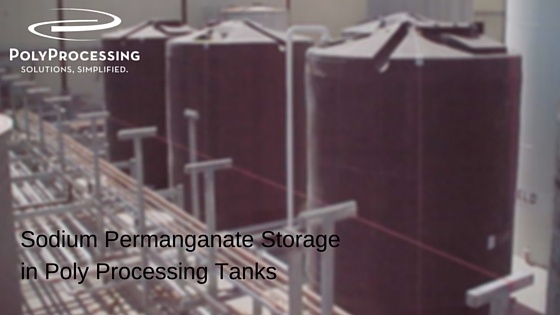Sodium Permanganate Storage in Poly Processing Tanks

NSF-61 Certification: Poly Processing is NSF-61 certified for Sodium Permanganate Storage.
Liquid oxidants, like sodium permanganate, are important in water treatment and other industries and how these agents are stored is equally as important. Sodium permanganate presents certain storage challenges, like its propensity to stain surfaces which it contacts.
Let’s take a look at sodium permanganate, its many uses, and how you can build an effective storage system.
Sodium Permanganate Chemical Properties and Uses
Sodium permanganate is a chemical oxidizer used to treat drinking water by removing contaminants such as iron, manganese, or arsenic, and destroying any other organics that are in the water.
Since it dissolves more readily in water and can be fed at high rates, sodium permanganate makes for an ideal solution for controlling taste or odor issues. It also works to deactivate harmful pathogens and viruses, although technically speaking it is not considered a disinfectant.
Because of the high solubility in water, sodium permanganate is also good for uses that require high concentrations of permanganate ion, like the etching of the plastic parts that make up a printed circuit board.
Sodium Permanganate Chemical Storage Challenges
 While not particularly challenging to store, sodium permanganate does have a purplish color that stains almost anything it touches. This means that the normal mechanical methods of seeing the chemical level through the tank is not a viable option after a couple of fills. Not only can you not see the level through a translucent tank wall, but a traditional site gauge is also not an option, as that fills with the chemical itself. To combat these issues we recommend the use of a Carbon Black tank to avoid visual staining of the tank wall, and a reverse float level gauge with an internal downpipe. Use of this level gauge means the visible marker stays chemical and stain free.
While not particularly challenging to store, sodium permanganate does have a purplish color that stains almost anything it touches. This means that the normal mechanical methods of seeing the chemical level through the tank is not a viable option after a couple of fills. Not only can you not see the level through a translucent tank wall, but a traditional site gauge is also not an option, as that fills with the chemical itself. To combat these issues we recommend the use of a Carbon Black tank to avoid visual staining of the tank wall, and a reverse float level gauge with an internal downpipe. Use of this level gauge means the visible marker stays chemical and stain free.
The dark purple solution is explosive when it comes into contact with sulfuric acid or peroxides and may react violently with readily oxidizable materials. It also may ignite wood and cloth and is corrosive to eyes on contact. It must be stored in a well-ventilated area and be kept away from heat and sunlight, which pairs well with the black tanks.
In order to effectively store sodium permanganate, Poly Processing suggests the use of a Vertical Tank with an IMFO fitting, that allows for a full-drain. In the event that there’s no containment available or a secondary containment is needed, we’ve designed the SAFE-Tank as a “tank-within-a-tank” option, eliminating the need for additional square footage for a secondary containment tank.
For more information on storing sodium permanganate or Poly Processing's NSF certifications, contact a chemical storage tank system expert today.
- April 12, 2016
- Topics: Chemicals
About Poly Processing
Posts By Topic
Tech Talk Podcast Episodes
Subscribe By Email
Recent Posts
- Ferric Chloride Storage: What Operators Need to Know Before Choosing a Tank
- Wastewater Treatment: Modern Approaches to Sludge Removal & Chemical Management
- Why Cycling Causes Tank Failure: Tips for Prolonging Tank Life
- Small Changes in Tank Selection for Big Long-Term Cost Benefits
- NSF Certification vs. FDA Compliance: Understanding Chemical Tank Standards
Tank Configurator

Find the recommended tank and system components for your chemical storage challenge.
Configure a Tank Package


